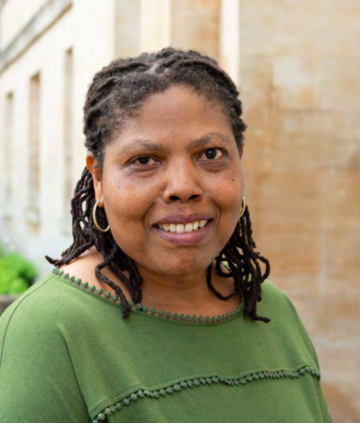Blueprint interview with Audrey Mbogho, AfOx-TORCH Fellow

Blueprint, the University of Oxford's staff magazine, recently featured an article with the brilliant Audrey Mbogho, who was a AfOx-TORCH fellow with us during Summer 2019. Her academic hosts were Prof Mary Dalrymple and Prof John Coleman from the Department of Linguistics. During her stay in Oxford, Prof Mbogho was a member of Wadham College.
Audrey Mbogho, Associate Professor of Computer Science at Pwani University in Kenya. Interviewed by Lucy Riddell, Headington School, on work experience with the University.
This summer Audrey worked in collaboration with researchers at the Faculty of Linguistics, Philology and Phonetics on a machine learning project. Her work will develop a web-based platform to preserve Kidawida – the language of the Wadawida of Taita Taveta County in south eastern Kenya.
How did you get involved with machine learning?
It’s an area of study in computer science and it also relates to my PhD work. I investigated the use of machine learning in helping children to identify objects – such as rocks – by showing them to a computer which had been taught how to classify different objects. While that was image processing, machine learning can be applied to many different fields, and it is ideal for my work in human language processing.
Have you always been interested in language?
Yes, I’ve been interested since I was a young child. I think it comes from my upbringing and culture. Whether talking in English or in Kidawida, my native language, I had to say everything correctly. There was an obsession with exactness. So language as an area that I can study as a computer scientist is perfect for me.
Are there any specific goals you want to achieve while you are in Oxford?
I’m working on setting up a platform to collect a Kidawida corpus. It’s a language that I refer to as under-resourced or under- developed as there’s not a lot written in it, nor many recordings. And there are no technologies developed for it. So I’m taking this first step to gather examples to enable machine learning.
Exactly what kind of information are you hoping to capture?
For machine learning to be successful you need as much data as possible, so the more people who get involved and the more diverse the content the better. Everything is welcome, from stories to political arguments. I’ve already added
a children’s tale, and a true account about my mother’s experience of colonial days, to help give others ideas. People can also comment on what’s written or ask questions – hopefully that approach will help gather more data. I also want to hold workshops in high schools where the students all contribute a story.
What excites you about your work?
Learning is exciting. In my field you have to do that constantly. You will never master it, so whatever problem you want to address, you have to go to books and the internet. You’re constantly researching. Unlike some other fields of study, such
as mathematics, computing is forever changing.
What are you enjoying about Oxford?
Being able to make use of the libraries and the networks to achieve things beyond my main project. I’m staying at Wadham College and there is a great library right next door to me. The space is very conducive to study and that’s a benefit I definitely want to take advantage of while I am here.
The AfOx TORCH fellowships aim to connect world-leading researchers based in African institutions to Humanities scholars based at Oxford University. Applications are open to researchers with interdisciplinary projects from a broad range of research areas in the Humanities. The Fellow will be based in Oxford over the Summer period and work with Oxford researchers in the Humanities, and across other disciplines where appropriate, to develop research ideas, projects and events. This can include research papers, ideas for co-led projects, future joint research developments in the area of humanities. Examples of areas of priority are research related to history, languages, religion, environmental humanities, medical humanities, digital humanities, performance and cultural heritage. Click here for more information on the fellowship.
Article and photo credit: Lucy Riddell, Blueprint Magazine Michelmas 2019, Oxford.


